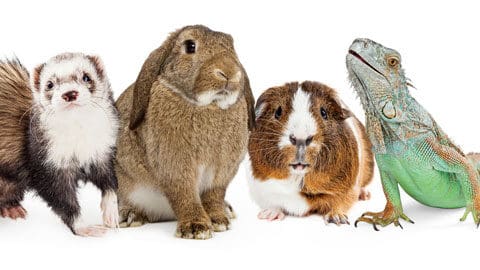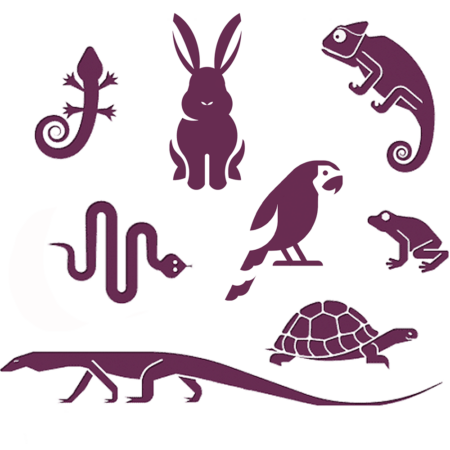Exotic Pets™
sponsored by Zoo Med
Reptiles Can’t Feel the Burn
#277: Dr. Doug cautions that faulty hot rocks, human heat pads and heat lamps used improperly can give 3rd degree burns to a reptile who cannot feel the damage.
33% of Pet Birds Test Positive for Borna Virus
#276: Dr. Jennifer Graham (board certified in Avian and Exotic Companion Animals) talks about this potentially deadly virus that is often in a breeder’s whole flock. Birds can be shedding borna virus without clinical signs — it’s not easily transmitted to other birds yet still contagious. The disease is costly to treat and sadly, once your bird has symptoms it is a death sentence.
“People Food” Can Harm Exotics
#275: Your ferret wants candy? Don’t do it! Even fruit is merely sugar plus water — give it sparingly to any exotic. Your bird loves cheese? Just say no! Chicken eggs for parrots — no! Too much protein for a bird is unnatural and can damage their heart, kidneys and liver so avian experts all agree to feed a balanced pelleted diet from a quality company. Dr. Doug Mader says, When in doubt, leave it out!
Check Your Bird’s Poop!
#273: Avian expert Dr. Jennifer Graham tells you all the ways that your bird’s droppings are a treasure trove of information.
Zoonosis — What Diseases Can Your Exotic Give You?
#273: Dr. Doug wants people to know about — but not be frightened by — the many illnesses exotic animals can transmit to people, especially those who are immunocompromised, elderly or young children whose immune systems are “not yet confident.”
Are Neurodiverse People Drawn to Exotic Pets?
#272: Tracie raises this question with the namesake of Jungle Bob’s Reptile World on Long Island, who goes into schools to put reptiles in a positive light and teach about what he calls “the Unloved, Unusual and Unknown” pets, to which many children are drawn.
Small Pet Birds Have Long Lives
#271: Dr. Micah points out that parakeets — also known as budgies — and cockatiels can live 8-10 years. It’s a responsibility and commitment. They need 65-75 degrees and 50% humidity. Nutrition matters, with Zupreem & Harrison food being the best.
Iguanas Have a Dark Side
#270: Dr. Doug says people buy a five INCH pet that becomes a five FOOT creature requiring 80% humidity and 80 degrees. In adolescence, when “in rut,” they can viciously attack their owners.
Anorexia in Exotics: What to do When They Won't Eat
#269: Dr. Kohles says that a decrease in appetite in a small mammal can be a big deal. They are a prey animal and keep problems to themselves for survival. Ask everyone in the household to pay attention to changes in appetite and behavior.
The Whole Truth About Bearded Dragons
#268: Dr. Stacey Wilkinson teaches us that we don’t know as much as we think we do about Beardies, America’s most popular exotic pet!



 Co-hosted by Dr. Doug Mader, author of “The Vet at Noah’s Ark: Stories of Survival from an Inner-City Animal Hospital,”who is a world-renowned specialist on exotic animals, author of four major veterinary textbooks on reptile and amphibians, and a passionate educator.
Co-hosted by Dr. Doug Mader, author of “The Vet at Noah’s Ark: Stories of Survival from an Inner-City Animal Hospital,”who is a world-renowned specialist on exotic animals, author of four major veterinary textbooks on reptile and amphibians, and a passionate educator.
